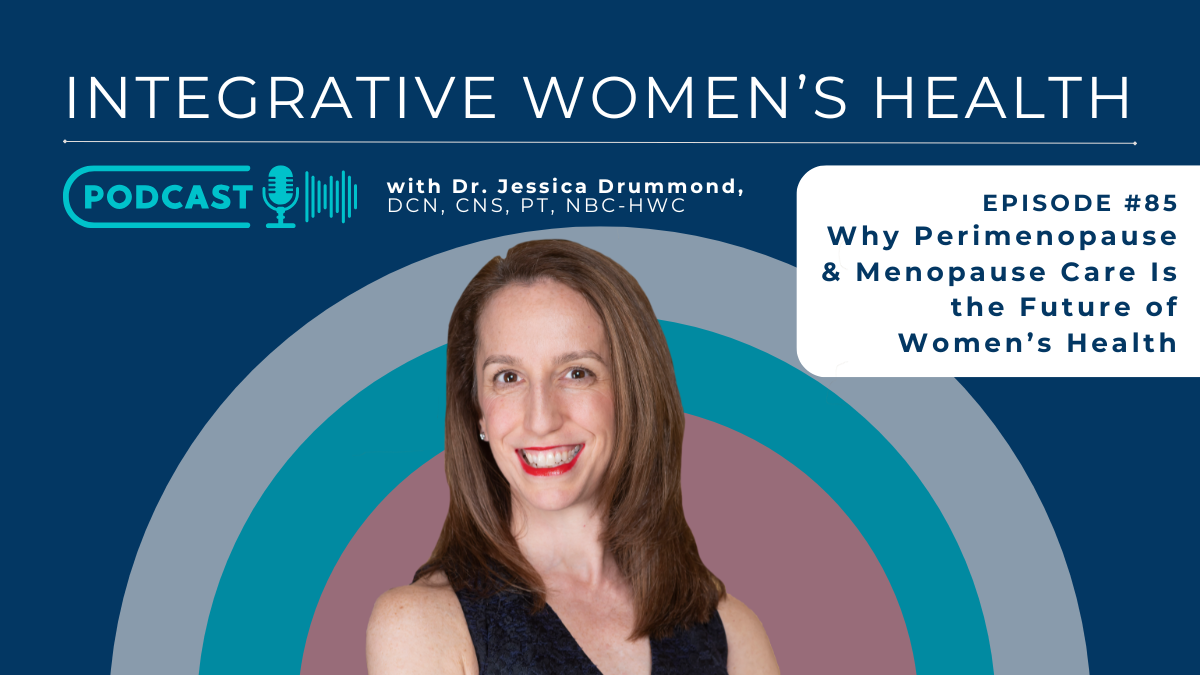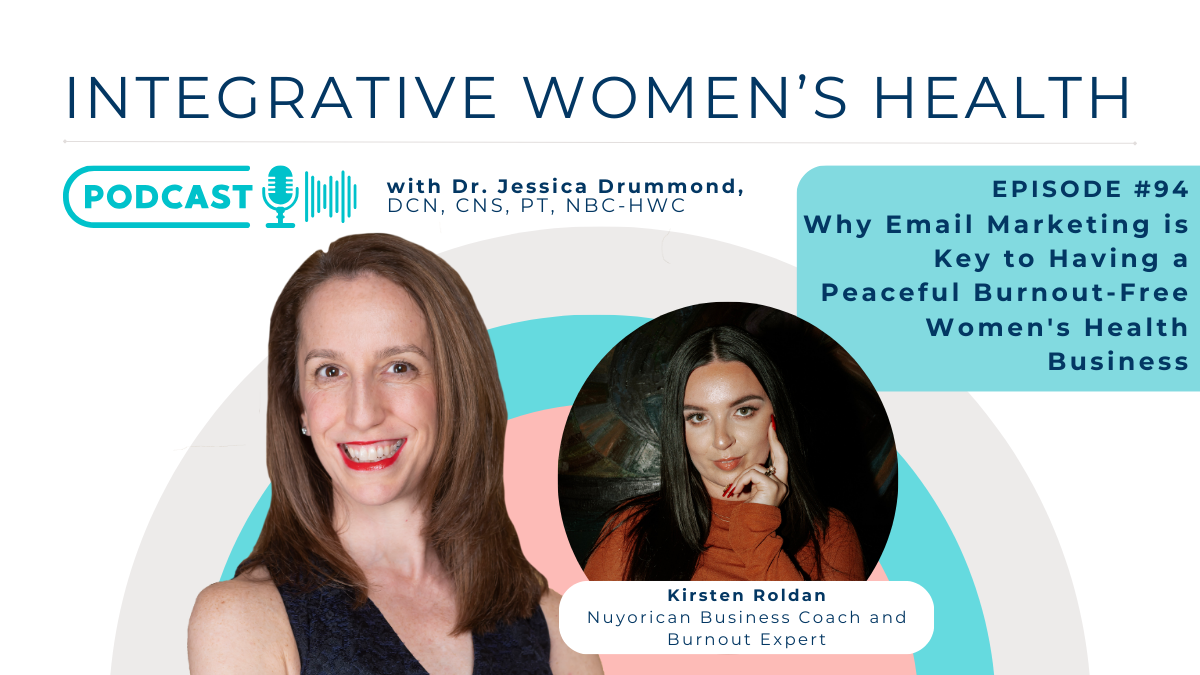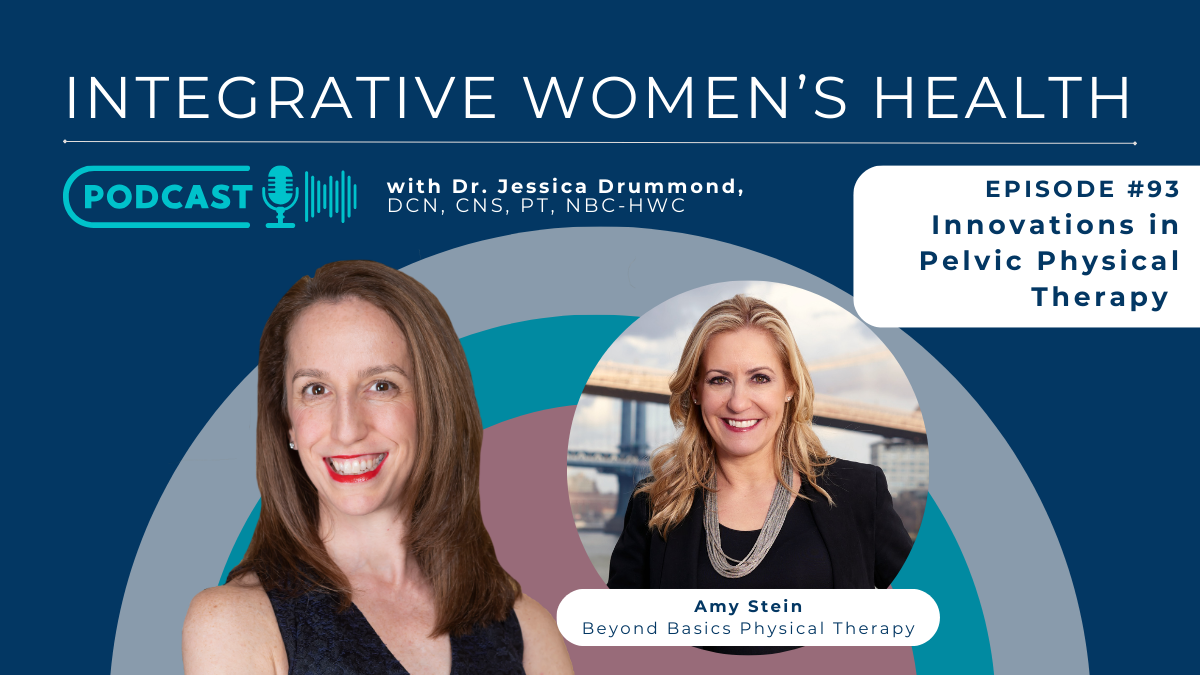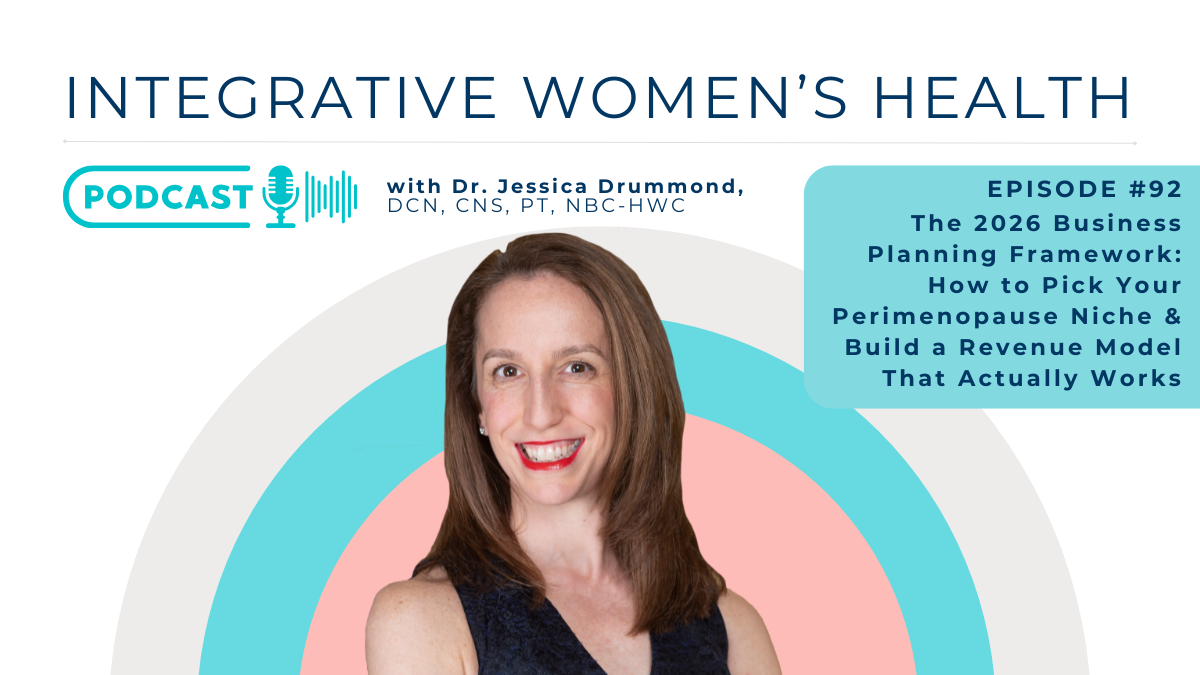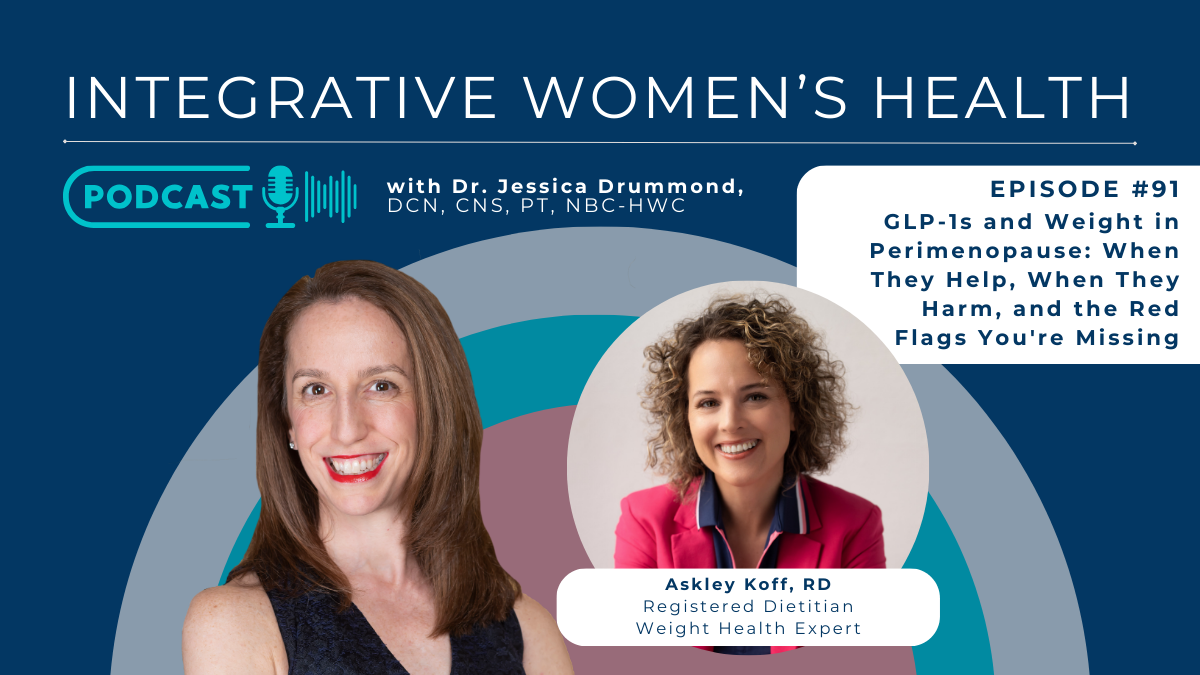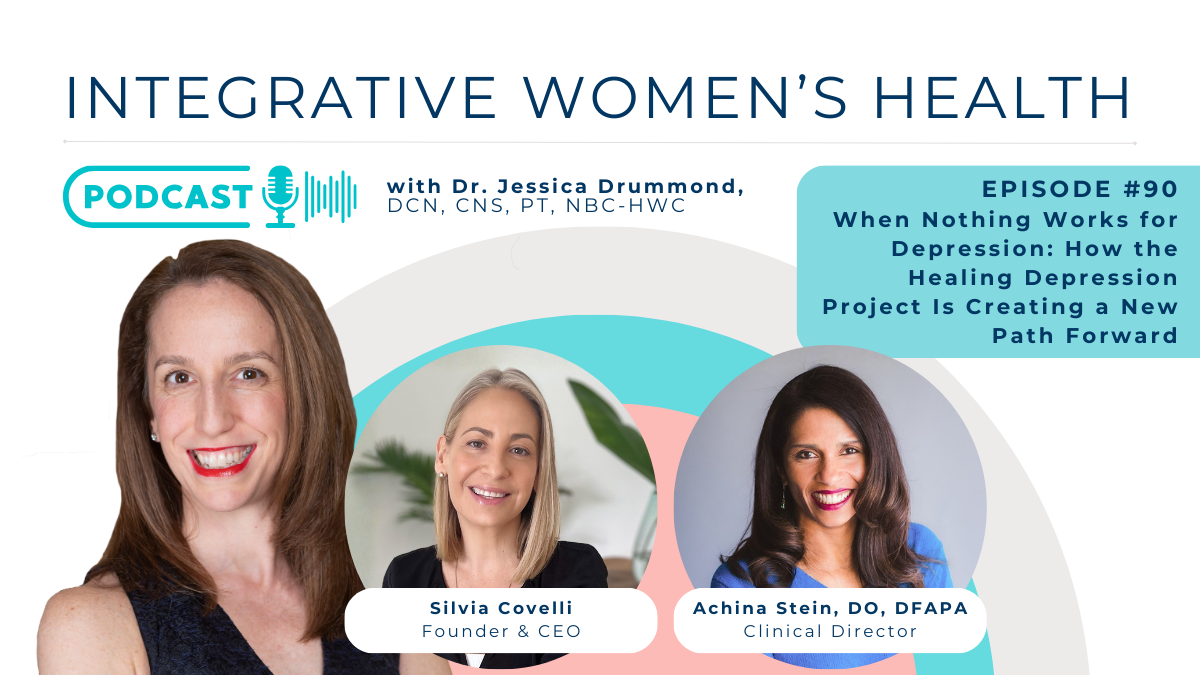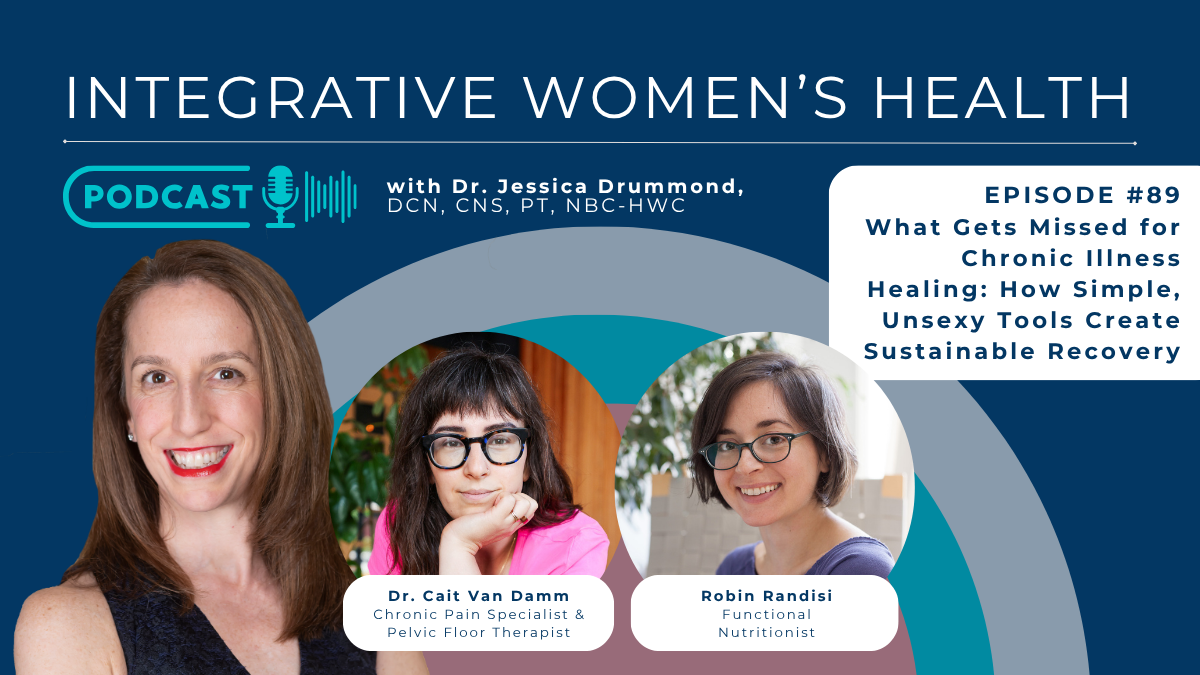Follow Us for Free:
About the episode
“Women’s health is never textbook. Complexity is the rule, not the exception.” – Dr. Jessica Drummond
Right now, most health professionals are still being trained to treat simple, textbook cases of perimenopause and menopause, leaving millions of women without the comprehensive, evidence-based care they deserve. At the same time, there’s a growing wave of public awareness, policy changes, and cultural conversation that’s putting menopause squarely in the spotlight. Women in perimenopause and menopause are tired of being dismissed, and they are actively seeking something different.
For women’s health practitioners, this growing need is a significant opportunity. In the United States alone, 1.3 million women enter menopause each year, and most of them want more support than they can get from social media and generic hormone protocols. Women in midlife are looking for practitioners who can combine nutrition, lifestyle changes, nervous system support, and coaching that fits their unique needs.
In this episode, I’m kicking off our Confidence in Complexity series by exploring why perimenopause and menopause care are the next frontier in women’s health, and why this is the perfect time to specialize. We’ll look at the numbers driving this global shift, the new policies and employer benefits emerging, why this field is growing faster than almost any other area in women’s health, and how a lack of training in traditional programs has left a massive gap that you are uniquely equipped to fill.
Enjoy the episode, and let’s innovate and integrate together!
Highlights
- Why menopause care is a critical and timely opportunity for health professionals
- Real stories of women being dismissed by providers and the need for skilled support
- The growing public awareness and demand for knowledgeable menopause practitioners
- Surging demographics, with over 1 billion women entering menopause by 2025
- Disparities in menopause symptoms, and the importance of culturally competent care
- The cultural shift driven by World Menopause Day, media, and celebrity advocacy
- New policy and workplace initiatives recognizing menopause as a public health issue
- The economic impact of untreated menopause on individuals and organizations
- Gaps in medical education and the expanding market for menopause expertise
- The importance of evidence-based, whole-person care
- Why this is the right time to specialize in menopause and lead change in women’s health
Ready to revolutionize your career and grow your practice?
- The Integrative Women’s Health Membership
- What is the next step in your career in women’s health and wellness? Start here: https://integrativewomenshealthinstitute.com/start-here/
- Integrative Women’s Health Institute on Instagram | @integrativewomenshealth
- Integrative Women’s Health Institute on YouTube
Learn more about The Integrative Women’s Health Institute’s Programs.
Click here for a full transcript of the episode.
Dr. Jessica Drummond 00:00:03 Hi and welcome to the Integrative Women’s Health Podcast. I’m your host, Doctor Jessica Drummond, and I am so thrilled to have you here. As we dive into today’s episode, as always innovating and integrating in the world of women’s health. And just as a reminder, the content in this podcast episode is no substitute for medical advice, diagnosis, or treatment from your medical or licensed health care team. While myself and many of my guests are licensed healthcare professionals, we are not your licensed healthcare professionals, so you want to get advice on your unique circumstances. Diagnostic recommendations treatment recommendations from your home medical team. Enjoy the episode. Let’s innovate and integrate together.
Dr. Jessica Drummond 00:01:02 Why perimenopause and menopause care is the future of women’s health. Why do we need to talk about this now? Welcome to the first episode of our Confidence in Complexity series. Here on this podcast, I’m your host, Doctor Jessica Drummond, where we will explore why perimenopause and menopause care aren’t just nice to have specialties, but the next frontier in women’s health.
Dr. Jessica Drummond 00:01:29 If you’re a clinician, coach, or wellness professional. This episode will show you the surprising numbers, the policy shifts, and the cultural momentum that make this moment the perfect time to specialize in this time frame in a woman’s life. I want to share with you a bit of the behind the scenes about why we chose to double down on educating women’s health and wellness professionals on that intersection between chronic illness and the perimenopause and menopause transition. Here at IWA, we have always focused on underserved populations, but also on populations that are ready and motivated to make a change because so much of the work happens in each woman’s individual home, individual life, she has to be ready. Women in this life stage are symptomatic, but they still have. And in fact more so sometimes in earlier in their lives, the time and potential to make significant changes in their health, behaviors and their lives that will improve their health and their lives for decades to come. And yet these women are being ignored, gaslit and dismissed by their own health professionals, some of which have been with them for years.
Dr. Jessica Drummond 00:02:54 Just this weekend I was visiting friends out of town. Two of them, who have access to a lot of health care, told me that their providers would not even prescribe hormone therapies until they completely stop having a period. Another told me that she had a bad reaction to hormones, and now has no idea what to do about her fatigue, her weight loss resistance, her sleep issues, and her doctor told her there was nothing she could do since she can’t tolerate the HRT. That’s just not true. That’s not her only tool. This is what he told her, that she’ll probably feel better sometime in the next 5 to 10 years when she’s fully menopausal. I mean, this is crazy. The good news is that even friends of mine who are not in health care at all know that both of these scenarios are just not true. But they don’t know where to go for help. Like they’re learning this from Instagram influencers. They’re reading all the books, but there is a deep need for health and wellness professionals who are in the field, who are seeing patients day to day, who are building group programs, who are building coaching programs that have the skill, the depth, the complexity of understanding around this midlife transition, especially in the world we’re in right now.
Dr. Jessica Drummond 00:04:09 Very high stress world. From blood sugar to relationship stressors to financial stressors. There’s a lot of stress right now, and women in perimenopause and menopause have been gaslit by their individual providers. Yet right now, we’re seeing a surge of public awareness that’s pushing for grassroots change. There’s an urgent need, not for just more influencers and educators. There’s already a lot of good being done on those fronts. Now we need you. Now we need the professionals who can get in the weeds with women. Build the coaching programs. Work with them one on one. Work with them in small groups. Help them navigate these transitions in a personalized and collaborative way, no matter how complicated their case is. In this episode, I’ll walk you through the demographic tidal wave of women entering midlife. The global campaigns and media attention are giving menopause a voice, and women really are hearing this, which that’s the great news, right? The economic and workplace impact of these untreated symptoms is now actually driving change, with new policies and new benefits, signaling institutional change at a governmental level and at a private sector level.
Dr. Jessica Drummond 00:05:44 So there’s a huge practitioner market gap. And if you’re ready to lead, This is for you. So let’s dive in and see why. Now is the time to commit this field. Number one, there’s a demographic tsunami. The numbers speak for themselves. First, consider the size of the population entering menopause by 2025. This year, over 1 billion women, 12% of the world’s entire population will be in menopause. And this is a new and growing demographic because, look, we’re just living longer and generally having fewer babies. In the United States alone, 1.3 million women become menopausal each year. The average woman spends about 40% of her life in post menopause, and at least three quarters of women experience bothersome symptoms. And the problem is they could be perimenopause, but they could be something else. And that’s what’s being ignored. Or both. Actually. Usually both. More than 80% of women experience menopausal symptoms, from hot flashes and night sweats to mood changes up to 75 to 80% experience based on motor symptoms like hot flashes, which can last for years or even more than a decade.
Dr. Jessica Drummond 00:07:11 They don’t just go away on their own, and these symptoms aren’t just uncomfortable. They can be debilitating, especially when combined with disabling diseases like autoimmune diseases, post viral syndromes, endometriosis, etc. and Black and Hispanic women experience vasomotor symptoms even more frequently and usually lasting a longer period of time. Certain populations are even more in need than others, and I would say it’s very often people with less socioeconomic health care access, but also those with underlying chronic illnesses or being at higher risk for chronic illnesses. So this demographic shift means that millions of women are looking for not just Instagram recommendations. They are looking for quality health care. They want their practitioners to be ready to serve them with complexity. So there’s this global awareness, this cultural shift this week. October 18th is World Menopause Day. It’s part of World Menopause Month. Over the past few years, public campaigns like these have pushed menopause into the spotlight. For example, there’s the hashtag Not Just in Your Head campaign that placed multilingual ads in New York City’s Times Square and subway stations to spark conversations and educate people.
Dr. Jessica Drummond 00:08:36 So, okay, now they’re educated, but where do they go? This is where you come in. Celebrities like Halle Berry and Naomi Watts have publicly discussed their menopause experiences, leading campaigns like Turn Up the Heat that combine advocacy with legislation. Again, that’s super important, but it doesn’t serve the individual woman to find a practitioner who can navigate her level of complexity. These efforts are breaking stigma and making it socially acceptable to talk about menopause openly, just like we’ve broken those molds around menstruation and pregnancy. Public awareness matters because it empowers women to seek help and challenges those health care systems to respond. So now we’re in that respond mode. We have to step up and respond. As awareness grows, so does the demand for practitioners who can provide educated, evidence based, personalized and collaborative care, not just one size fits all hormone prescriptions. We’re also seeing changes, not just generally in the zeitgeist and in the public sector, but policymakers in the public and the private sectors are recognizing that menopause is a public health issue that will not go away.
Dr. Jessica Drummond 00:09:59 In fact, it’s going to keep growing. In 2025, Rhode Island became the first US state to require workplace accommodations for menopause, adding it into protected categories in labor law. California is considering the Menopause Care Equity Act, which would require health plans to cover evaluation and treatment of perimenopause and menopause. And I would love for us to go beyond even the basics of that care and to offer physicians continuing education credits for menopause training. These measures really highlight a shift from seeing menopause as a private issue to viewing it as a matter of important public health care access and equality. Corporations are taking notice because when there are laws that are disjointed, corporations have to follow different laws in different places, so they begin to make policy. A recent survey found that 18% of companies plan to offer benefits in 2025. That’s up from just 4% only two years ago. Employers are exploring flexible work times, workplace accommodations, wellness programs, extra days off and even specialized benefits like hormone therapy access, which even those basics. As I told you from my stories of meeting up with my friends this past weekend, are hard to get right now.
Dr. Jessica Drummond 00:11:33 However, 62% of employers say that they are unlikely to offer menopause leave in the next five years. These data show both progress and room for improvement, and they signal to practitioners that corporate partnerships and employer education are emerging areas of impact. The UK is actually leading the way on workplace excellence in perimenopause and menopause, and our graduate, Pamela Wendell, is leading that charge. You can learn more about how to provide corporate services in our masterclass with her, inside of the Integrative Women’s Health membership. I love that class because it shows that when you see a need as one of our graduates, you have the skills to create a pretty cool job for yourself, even if you don’t want to work in the traditional settings. So we’ve talked a little bit about the changing laws, the changing corporate policies. Let’s talk about the economic Impact. That’s why these policies are changing. Let’s just face it. Untreated menopause symptoms cost individuals and businesses. That’s where they start to make noise. Globally, productivity loss due to just vasomotor symptoms alone is estimated at over 660 million every year.
Dr. Jessica Drummond 00:13:00 In the United States, 13.4% of women aged 45 to 60 report at least one adverse work outcome, such as a missed workday or reduced productivity related to menopause, and more than 10% report missing work entirely because of menopause symptoms. These absences translate to an estimated loss of $1.8 billion in the US economy every year. And look, we can’t afford that right now. We really can’t. The economic burden underscores why governments and employers are starting to pay attention at the end of the day. This is what government and employers care about. And so we have to align ourselves with those economic shifts. Companies that support employees through menopause via benefit education, flexible policies, health care access will retain better talent, have better productivity and reduce turnover for practitioners. These data points point to an urgent need for your services. Your expertise can mitigate these losses and improve quality of life. So as you can see, there’s this market gap. There’s a huge market opportunity. There’s demand for the support. There is a lot of lack in terms of optimising the delivery of this support.
Dr. Jessica Drummond 00:14:32 But despite the scale of menopause. Impact. Medical training has not kept pace. Fewer than 20% of even ob gyn residency programs provide any menopause training. In 2017, a survey found only 7% of medical residents felt prepared to manage menopause and over 20% received no lectures on perimenopause or menopause at all. This training gap explains why so many clinicians feel out of their depth when they’re treating midlife women. And this is just the absolute basics, not what happens when they also have endometriosis, or they also have long Covid, or they also have an autoimmune issue or a thyroid issue. Right. And this exact same challenge in education is true for physical therapy, occupational therapy, dietitians, nutritionists, mental health professionals, nurses, nurse practitioners, Pas all of our education programs have huge gaps in this area. At the same time as the market is exploding dramatically and so you’re more, more and more likely to see these patients in your practice. Analysts valued the global menopause market at over 17,000,000,000 in 2024, growing to over 24 billion by 2030.
Dr. Jessica Drummond 00:15:53 That’s a huge growth rate. Women are spending money on everything from hormone therapy and supplements to wellness and lifestyle coaching. That is a good thing, but we need to make sure they are spending their money well in an evidence based way, and we need to do better. We can’t just be like offering one size cookie cutter. You know, hormone therapies alone without looking at the whole system. That’s this woman’s dealing with or stacks of unproven supplements or just like A.I. algorithmic checklists. This is what’s coming. But instead we need to approach perimenopause and menopause care as whole person care that best addresses its complexity with health coaching, with knowing the overlaps between the midlife transition and chronic illness, and with having the business acumen to create programs that will set women up for success and support over time. There’s no quick fix. There’s no easy checklist. If there were, I would just sell that. I wouldn’t make this so hard, right? That’s where you come in. You have the opportunity to show up with the skill set that combines this complexity with the midlife transition to actually meet the huge demand for complex menopause care of over a billion women a year.
Dr. Jessica Drummond 00:17:25 This is a huge opportunity if you’re a clinician, a health coach, a wellness professional to step into the health care system and just do better work than is currently being done in the health care system as a whole. And it’s also crucial to recognize that menopause doesn’t affect all women equally, as I mentioned before. Black and Hispanic women experience vasomotor symptoms more frequently and for longer durations, and some groups also face earlier menopause. About 5% experience menopause between the ages of 40 and 45, even on average, and about 1% of women experience menopause before the age of 40. And sometimes that’s premature and can be reversed. These disparities highlight the importance of both culturally competent care, but also care that understands the intersections and risks of the hormonal midlife transitions with other complex chronic illnesses. Practitioners who can address diverse experiences and understand the risk factors that are the social determinants of health will make even more meaningful impact in the populations that are being the least well-served. In fact, we know that there are some factors that can actually extend the time until menopause, which is healthier.
Dr. Jessica Drummond 00:18:56 And we also know some of the factors that can suppress these reproductive hormones, essentially putting people into earlier perimenopause and menopause. And we should start educating women on these as early as their 30s. And if you don’t know what these are yet, you are going to learn them in our Perimenopause and menopause certificate program. So why now? Let’s connect the dots of why it’s so important to think about adding midlife. Care to your practice or even beginning to specialize in this group? First of all, there’s a demographic surge 1.3 women entering menopause every year in the US alone. Two women know this is happening World Menopause Day, public health campaigns, celebrities talking about it have broken the silence, which is good. But there’s no one to help these women, right? There’s policy momentum. We’re seeing laws change in the UK, in Rhode Island, in California and other states to follow, and corporate policies are following. At the end of the day in the US, follow the money. Right. There’s economic urgency.
Dr. Jessica Drummond 00:20:14 Untreated symptoms cost billions to corporations in lost productivity. And yet traditional health care Education is not teaching this at all. Like 80% of even obstetrician gynecologist are getting no training. 93% of all physicians are getting no training, not to mention all other allied health professionals. This market is growing at over 5% annually, and will hit over $24 billion in the next few years. These forces are converging to create an unprecedented opportunity for you to step in and meet this vast unmet need. You’ll differentiate your practice. You’ll build a career that serves women during this pivotal life stage and then for decades beyond. Think about all the super healthy 8090 year olds we’re going to have if they start in their 30s, 40s and early 50s. If this episode has you thinking, I want to be a part of this movement, then you’re in the right place. Over the next few weeks, we’ll delve deeper into building your confidence in complexity, helping you manage specific menopause symptoms, and design thriving practices in ways that are even more supportive for these women.
Dr. Jessica Drummond 00:21:38 I really find group coaching to be a great model, for example. For now, I invite you to take action if you’re ready to build a fulfilling, flexible career specializing in perimenopause and menopause care. Download my free training how to build a fulfilling, flexible perimenopause and menopause Career. That’s the title if you’re already coaching, if you’re already practicing midlife, perimenopause and menopause care, and you just want to attract more clients without burning yourself out. Tune in to our free workshop, How to Build a Thriving Perimenopause and Menopause Health Coaching Practice. The links to these resources will be in our show notes and will give you actionable steps and prepare you for having discussions and hearing the upcoming discussions on this podcast. If you’re ready to go deeper, you can apply and schedule a call with our career coaching team to discuss if the Perimenopause and menopause certificate program. Confidence in complexity. Where are the practitioners like you, who master the art and science of supporting midlife women to live healthy for decades to come? That’s where you will get that missing education that you did not get in your training program.
Dr. Jessica Drummond 00:22:57 And even if it’s not the right step. Our career coaches are just wonderful people to help guide your next steps. So thank you for joining me today. Together, I really do believe that we can transform midlife care in the same way that I have seen fertility care, endometriosis care, pregnancy care, postpartum care really be transformed through my career. Your action step for this week. All right. What’s your next step? Watch one of the trainings and apply and schedule your call with our career coaching team. Our career coaches are master coaches. They are experts in helping you figure out your next career and life steps, even if it’s not joining one of our programs. Our goal is for every women’s health and wellness professional to have a thriving career without burnout too, and for you to have the skills to help women get to the very root cause of their healing. Don’t forget, women’s health is never textbook. Complexity is the rule, not the exception. Most programs prepare you for the textbook cases. We prepare you for the real ones.
Dr. Jessica Drummond 00:24:12 I can’t wait to support your next career step right now, at this very moment, There are over a billion women literally on Google or ChatGPT searching for you right now. The need is great. Thank you for the work that you do each and every day, and I’ll see you on the podcast next week as we continue our confidence and complexity series. Have a great week.
Dr. Jessica Drummond 00:24:44 Thank you so much for joining me today for this episode of the Integrative Women’s Health Podcast. Please share this episode with a colleague and if you loved it, hit that subscribe or follow button on your favorite podcast streaming service so that we can do even more to make this podcast better for you and your clients. Let’s innovate and integrate in the world of women’s health.
Join Dr. Jessica Drummond to learn the three key steps to becoming a successful, board-certified Women’s Health Coach who leaves a lasting positive impact on their clients.
Learn how utilizing health coaching skills in your practice is crucial to your success, leaving a lasting impact on your clients, and shifting the paradigm of women’s healthcare.

Dr. Jessica Drummond
Founder & CEO
The Integrative Women’s Health Institute
At the Integrative Women’s Health Institute, we’ve dedicated 17 years to crafting evidence-driven, cutting-edge programs that empower practitioners like you to address the complexities of women’s health.
Dr. Jessica Drummond’s unique approach focuses on functional nutrition, lifestyle medicine, movement therapies, nervous system dysregulation, trauma, and mindset – essential elements often overlooked in traditional health education.
In addition, your training will be fully evidence based, personalized, and nuanced (this is not a cookie cutter approach) in functional nutrition, exercise, recovery, cellular health, and all other lifestyle medicine tools.
You’ll learn to support your clients with cutting edge tools safely and effectively.

